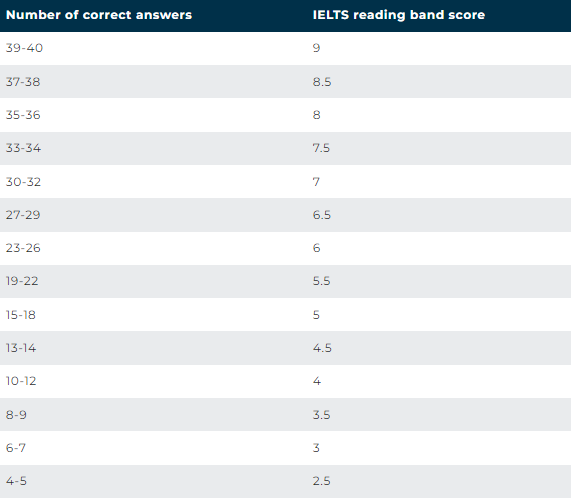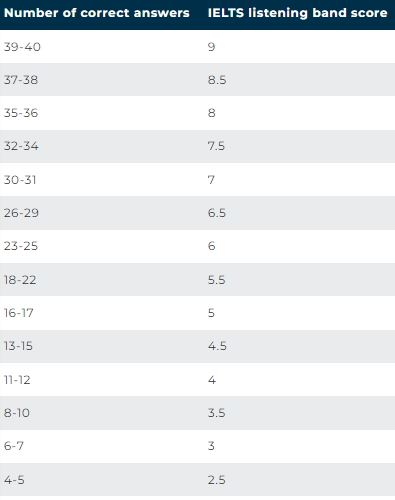You can fulfill your dream of studying overseas after qualifying for IELTS. It’s a widely accepted English language proficiency test when you want to migrate to foreign countries. Therefore, the IELTS band score is widely accepted by various companies and institutes globally.
A top-notch IELTS Exam band score calculator is the key to getting admission to your favorite university and availing the world of opportunities. So, are you willing to know IELTS Scoring System and marking criteria?
This blog targets to showcase to you the methods for IELTS Scoring System. Let’s get started.
How does the IELTS Band Score Calculator work?
0-9 band score is considered the lowest and highest possible score in IELTS Scoring System. There are 4 sections: listening, writing, reading, and speaking. The entire band score is the average score of all the skills, which are shown in the following table:
| Reading | Listening | Speaking | Writing | Overall |
|---|---|---|---|---|
| 7.5 | 8 | 7.5 | 7 | 7.5 |
As elaborated on the IELTS website, the test results are measured to the closest 0.5 or full band score. Therefore, if the final band score isn’t 7.5, as mentioned in the above table, your score is thrust to the closest whole score based on which is considered the closest. However, you can check out the examples of how IELTS Scoring System works:
- If you score 6.1, it might go down to 6, which is the closest band score. Therefore, in simple terms, 6.1 is nearest to band 6 compared to 6.5.
- In case you achieved 6.85, the end result will be band 7 because 6.85 is closer to 7 than 6.5.
- Similarly, when you score 6.25, your score will be raised to 6.5.
- It can be seen that the score could round up or down to the closest 0.5, as mentioned above.
IELTS band score and marking
Are you wondering what the marking criterion of the IELTS test is? Knowing its marking pattern is also essential to getting the coveted IELTS band score. Therefore, let’s learn more about the different sections of the IELTS test and the markings in them.
IELTS Reading Band Score
The reading task possesses 40 MCQ questions, where you will obtain one mark for every correct answer provided. The table is shown below:

IELTS Listening Band Score
This section also contains 40 questions, and the number of the right answers and similar IELTS listening band scores are shown below:

IELTS Speaking Band Score
In this section, the IELTS aspirants have to sit in front of a professional examiner, who assesses their speaking skills based on:
- Pronunciation
- Coherence and fluency
- Accuracy & Grammatical range
- Lexical Resource
IELTS Writing Band Score
This section consists of two tasks and is assessed by veteran examiners. The IELTS writing task score is based on the following factors:
- Coherence and cohesion
- Task achievement
- Accuracy and Grammatical range
- Lexical Resource
Preparation Tips To Score High in IELTS Score Band
- Know the Test: Before you dive in, understand the structure of the IELTS exam (Listening, Reading, Writing, Speaking). Familiarize yourself with the question types for each section and the allotted time.
- Reading Powerhouse: Cultivate a strong reading habit. Read a variety of materials like newspapers, magazines, academic articles, and fiction to build vocabulary and comprehension skills.
- Active Listening: Practice active listening skills. Watch English movies and TV shows, listen to podcasts, and find an English conversation partner. Pay attention not just to the content, but also to accents and pronunciations.
- Sharpen Your Writing: Write regularly in English. Start a journal, take online writing courses, or find a writing partner to exchange feedback with.
- Speak with Confidence: Practice speaking English as much as possible. Find conversation groups, join online forums, or talk to yourself in English to boost fluency and confidence.
- Mock Tests: Take advantage of IELTS practice tests under timed conditions. This simulates the real exam experience and helps you manage your time effectively.
- Identify Weaknesses: Analyze your practice test results to identify areas needing improvement. Focus on those areas and tailor your study plan accordingly.
- Feedback is Gold: Seek feedback on your writing and speaking skills from a qualified teacher or native speaker. This feedback can highlight areas for improvement and provide valuable insights.
- Get a Good Night’s Sleep: Ensure you’re well-rested on exam day. A clear and focused mind is essential for optimal performance.
- Arrive Early: Avoid last-minute stress by arriving at the test center early. This allows you to settle in comfortably and prepare mentally.
- Stay Calm and Focused: Take deep breaths and remain calm during the exam. Focus on the task at hand and trust in your preparation.
Wondering how you’ll score in IELTS? Use our IELTS Band Score Calculator to find out instantly!
Conclusion
By understanding how the IELTS scoring system works and familiarizing yourself with the marking criteria for each section, you’ll be well on your way to achieving the band score you need. Remember, a strong IELTS score unlocks a world of opportunities, from studying abroad to furthering your career. So, take a deep breath, dedicate yourself to focused IELTS preparation tips mentioned earlier, and confidently approach your exam. With the right preparation and a strategic approach, you can turn your dream of studying overseas into a reality.
Also Read:
- Set Your Target Score – Know Scoring Pattern Of DUOLINGO Vs IELTS
- PTE vs CELPIP vs IELTS : Which Is Best English Test For Canada PR







